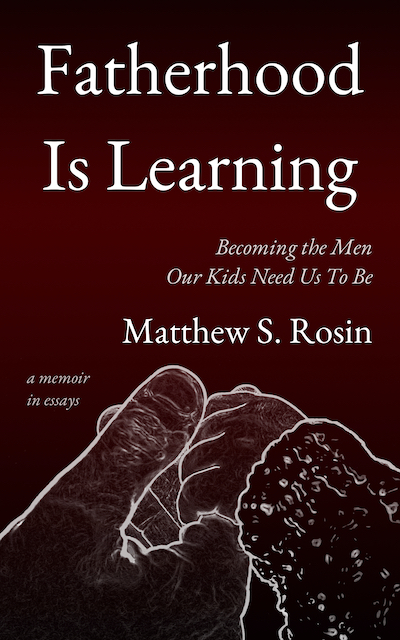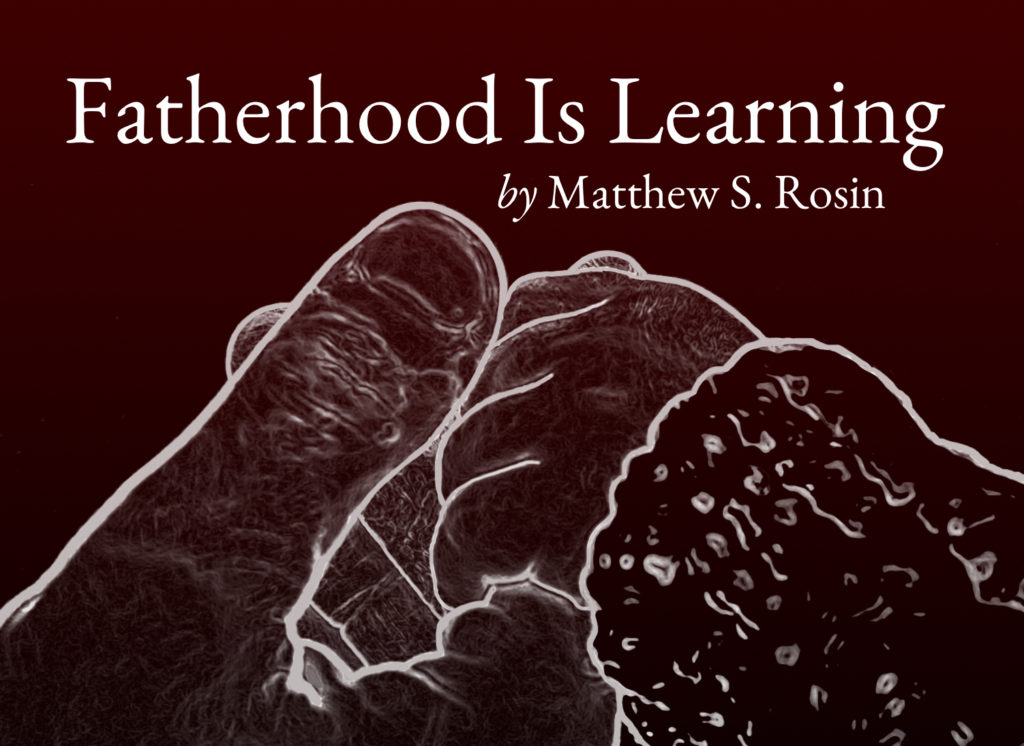In April 2019, Steven Wingate’s debut novel Of Fathers and Fire was published by the University of Nebraska Press. The novel follows a 17-year-old man-child, Tommy Sandor, who’s just learning that his mother lied to him about who his father is, and whose actual father—recently released from prison—has come to town to find him.
Wingate is also an essayist and the author of a moving digital memoir, daddylabyrinth. There, Wingate works to cultivate, on behalf of his sons, a more-merciful masculinity than the troubled and angry model given to him by his own father.
I interviewed Wingate about the connections between Of Fathers and Fire and daddylabyrinth, navigating masculinities in youth and adulthood, fear and shame, and the necessity of mercy.
* * * * *
Rosin: Having read both your novel and your digital memoir, it strikes me that Of Fathers and Fire puts the reader inside Tommy’s own fictional daddylabyrinth. The novel describes “too many Tommies” inside the one young man, each emulating or rejecting a different vision of manhood. Tommy’s story also borrows and remixes aspects of your own biography.
Does one project predate the other, or were they roughly contemporaneous? Did working on one clarify your intentions with the other?
Wingate: These two projects are two soups cooking from the same base. Ever since I first became a father in 2005—after decades of believing I’d never be one because I thought I’d inherited my father’s “curse” of mental illness and emotional violence—my mind has been chewing on fatherhood. I wanted to make sure I didn’t go down the same path of anger that my own dad did, and I dealt with this threat the only way I knew how: by writing.
Part of that came out in fiction through writing Of Fathers and Fire, which I started around 2006. At the same time, I had many nonfiction fragments of father/son material but no way to make them into a traditional book. Finally, in 2012, I discovered Scalar, the digital platform daddylabyrinth is built on, and it let me sprawl in a way linear storytelling wouldn’t. By then, I’d done a few versions of the novel, and I forgot about fiction awhile to “go digital.”
Writing about fatherhood and sonhood in daddylabyrinth gave me a strong sense of the multiplicity of male identity. Aren’t men always facing the “too many selves” problem the way Tommy is, trying on and rejecting different versions of masculinity? And I don’t mean just young men. I’m continuously asking myself as an adult what kind of man I want to be, and I don’t think the process is substantially different than it was when I was Tommy’s age. I’m simply more used to it now and can better foresee the consequences of my choices.
Whatever our age, we’re continuously curating our own sense of masculinity. That’s why I believe we can change our personal and intergenerational narratives. My sons are growing up in a very different environment than I did, and it’s not just a matter of stability or social class. It’s a matter of them having a father who decided that the line of emotional violence has got to stop with him. Both daddylabyrinth and Of Fathers and Fire are linked to that personal project: moving away from emotional violence, from anger toward mercy. I don’t think writing these projects solved my problem, but the energy I spend stopping that legacy has defined how I curate myself as a man.
Rosin: Of Fathers and Fire powerfully portrays the difficulty of sorting through the self, and I found the story’s “magical” elements particularly captivating in this regard. For example, I was intrigued by how hate accumulates physically in the characters’ bodies as lumpy chunks, which they must learn to find and extract through the skin, lest it destroy their capacity to enter into fellowship with others.
Wingate: The most direct sign that we don’t know ourselves is our bodies. We take them for granted but don’t fathom all their secrets or have control over them. They’re our first paradox: intimately familiar, yet ultimately unknowable.
The magic of the body is essential and primordial, and I wanted to get at that energy with my use of the supernatural in the novel. What I’m working with isn’t Harry Potter magic. There are no spells you need to be specifically trained to use, because the magic is in your body already. The characters simply cultivate a direct connection with the natural elements that they can use.
What happens in the novel is more like rain dances and shamanic incantations than it is like magic. I wanted to dig down to the roots where we are one with the world and write from there. This spiritual relationship with nature is the fundament of what would later grow into the religions of the world, and it’s a current that still runs inside those religions, whether they choose to admit it or not.
Rosin: Fear and shame loom large in the journeys of Tommy’s mother (Connie Sandor) and father (Richie Thorpe), and Connie’s predicament shows the brutal consequences of a narrowly-conceived masculinity most starkly.
Richie is steeped in his culpability for the death of Tommy’s grandfather, his shame at having been absent from Tommy’s life while in prison, and his dread that Tommy will reject him when he learns the truth.
But Connie’s journey is the most painful to witness. The important men in her life have failed her repeatedly, and vulnerability at their hands is deadly. So, she lies to her son about his father’s real identity. She won’t engage with her son’s faith because Christians have treated her as a fallen woman. When Richie finally shows up with his religious co-travellers, Connie is terrified that her son will reject her and run away with him. And in the most wrenching scene of the novel, Richie tries to force Connie to beg forgiveness before the entire town, as if she were the obstacle to his and Tommy’s self-realization.
Wingate: Connie and Richie’s lives are grounded in fear and shame, and those dark forces are the two biggest engines in the novel. I think Richie wants to love his son, but his crimes and the time he did for them in prison have altered his moral compass. I didn’t want to portray him as some crazy preacher, which would’ve been the worst cop-out possible. Yet by any but the most punitive standards of the Christian religion he professes, he’s crossed over into sin when he tries to shame and humiliate Connie into “confessing” her lies to him.
Connie’s fear and shame, as you point out, unfold in the context of masculinity and her responses to men. She has an interesting relationship with patriarchy. Before Richie comes along, she’s “daddy’s little girl,” who he dreams will take over his business someday. Then she’s drawn to Richie Thorpe, a powerful male figure who’s in tune with nature. The “strong man,” whether a patriarchal presence or an animalistic one, remains a shadow with tremendous power over her.
Now that her own son is growing up into a man like his father, Connie knows she needs to make a move. She’s got to get out from under the thumb of Richie—and Tommy—the same way she got out from under the thumb of her father, whose rules she slipped away from by loving Richie in the first place. I don’t want to present her as a feminist icon because she doesn’t have the self-consciousness to bear that. But she’s definitely looking for freedom from the shadow of masculinities that sought to define and confine her.
Rosin: Of Fathers and Fire makes a compelling case that, without mercy and the courage to know and be changed by another, we’re left with only fire. And in daddylabyrinth, you write, “It’s possible to live your life in the light without first seeking the darkness. Don’t hoodwink yourself into believing that you have to take that road just because others have justified their time in the darkness.”
Where do you find mercy today?
Wingate: Of Fathers and Fire is a tragedy of mercy not happening: between mother and son, between father and son, and within Tommy himself. I believe that the world is fundamentally a place of mercy, and that humans have beaten down mercy for as long as we’ve existed. We beat it down with power and hate and greed. Mercy is light, and we’ve created for ourselves a place of darkness—possibly for no other reason than that it’s our place. It may be miserable, but it’s of our own creation.
In daddylabyrinth, I was looking for sources and instances of mercy because I knew I could never be a father without it. My own father never seemed to hold onto mercy for long. He lived in resentment and anger, and I brought forward both of those. But I knew I couldn’t pass them on to my sons—it would be a horrible birthright. Mercy had to be an essential aspect of my own life as a father, or I’d end up poisoning my sons. I know I haven’t completely succeeded at giving them the birthright of mercy, but dammit, it’s my life’s work—more urgent than anything I’ll ever write—and I’ll try to the very end.
* * * * *
Steven Wingate is a multi-genre author whose work ranges from poetry to gaming. His books include the novel Of Fathers and Fire, published by the University of Nebraska Press in 2019, and the award-winning short story collection Wifeshopping (Houghton Mifflin Harcourt, 2008). His digital works include the interactive memoir daddylabyrinth, which premiered at the Art/Science Museum of Singapore in 2014, and the interactive romance novel Love at Elevation, published in 2018 by Choice of Games. He is a husband, a father of two sons, and an associate professor at South Dakota State University. His next novel is due from the University of Nebraska Press in 2021. Find him at www.stevenwingate.com.
Matthew S. Rosin is a husband, stay-at-home dad, author, and composer based in the Bay Area, California. His essays explore how fatherhood changes the man and have appeared in STAND Magazine and Fatherly. Rosin also writes fiction, including the novelette The Honeydrop Tree and stories in KYSO Flash, The Luxembourg Review, r.kv.r.y. quarterly, and Shotgun Honey. Find him at www.matthewsrosin.com.



